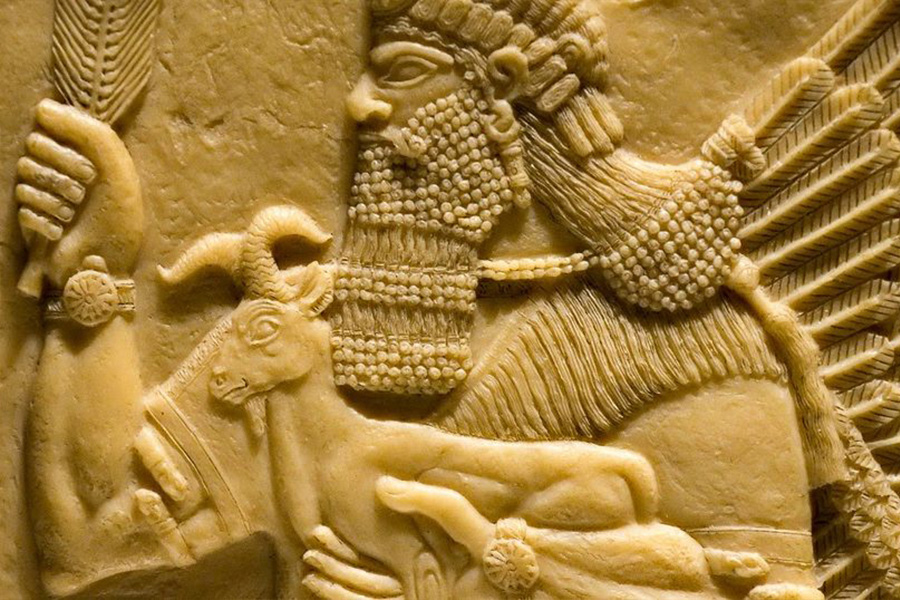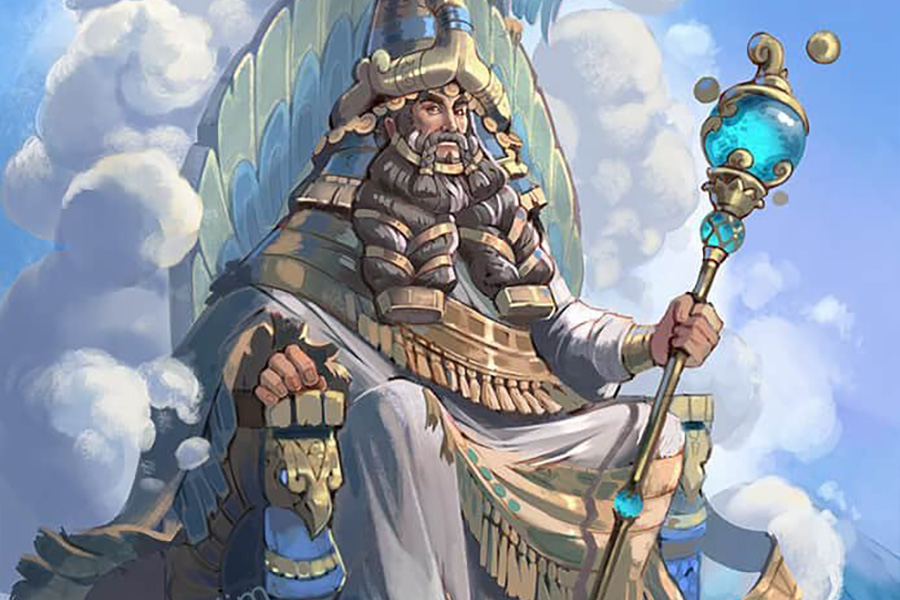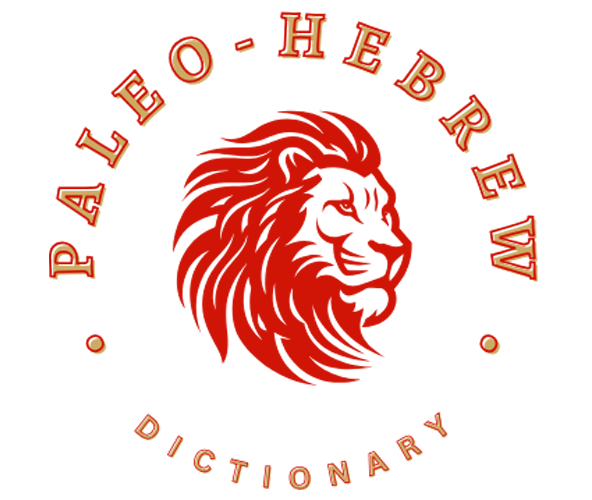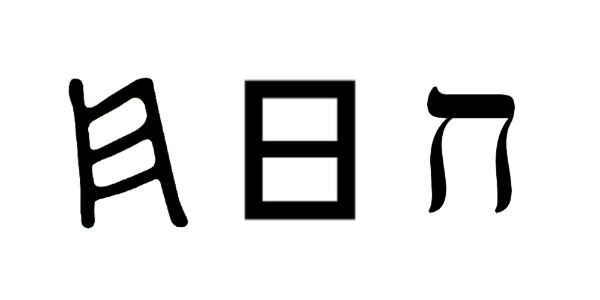The word an (𐤀𐤍) means “where” and is the shortened name of the progenitor of the Anunnaki.
The Paleo-Hebrew language or the original language of the Ābarayam is one spoken with an emphasis on the rauakh (breath, wind, spirit). With the language of the Ābarayam, each letter has a meaning and a number associated with it that adds meaning to each word they’re used with. Below you will be able to learn more about the letter in Ancient Hebrew, Yiddish Hebrew, Greek, and much more.
Letter Meanings
| Letter | Meaning |
|---|---|
| 𐤀 (a) – ah | Ox, strength, leader Prefix: Turns word into first-person |
| 𐤍 (n) – na | offspring, seed, fish, heir, kingdom, continue, perpetuate |
| Ābarayat Number | 51 = 1 (a) + 50 (n) |
| Hebrew Gematria | 41 = 1 (a) + 40 (n) |
| English Gematria | 92 = 6 (a) + 84 (n) |
| Simple Gematria | 15 = 1 (a) + 14 (n) |
Based on the meaning of the letters the word could be defined as:
- “strength of offspring”
- “strength of kingdom”
- “leader of kingdom”
- “strength of heir”
- “strength to continue”
Definitions for 𐤀𐤍 / an
| Language | Word | Transliteration | Pronunciation | Definition |
|---|---|---|---|---|
| Ābarayat | 𐤀𐤍 | an | awn | where? whither? |
| English | where | where | wair | in or at what place? |
| Hebrew | אָן | an | awn | where? whither? |
| Arabic | ان | an | awn | to, that |
| Greek | ποῦ | pou | poo | where, in what place. |
Images for 𐤀𐤍 / an


Mesopotamian Supreme Being
𒀭 (An) / 𐤀𐤍 (An) is also known as 𒀭𒀭 (Anu) / 𐤀𐤍𐤅 (Anau) and (Anum) / 𐤀𐤍𐤅𐤍 (Anauan) was the divine personification of the sky, the King of the gods, and ancestor of many of the deities in ancient Mesopotamian religion. He was regarded as a source of both divine and human kingship and opens the enumerations of deities in many Mesopotamian texts.
At the same time, his role was largely passive, and he was not commonly worshiped. It is sometimes proposed that the Eanna temple located in Uruk originally belonged to him, rather than Inanna, but while he is well attested as one of its divine inhabitants, there is no evidence that the main deity of the temple ever changed, and Inanna was already associated with it in the earliest sources.
After it declined, a new theological system developed in the same city under the Seleucid rule, resulting in 𐤀𐤍 (An) being redefined as an active deity. As a result, he was actively worshiped by inhabitants of the city in the final centuries of the history of ancient Mesopotamia.
In the Hurrian myths about 𐤒𐤅𐤌𐤀𐤓𐤁𐤉 (Qauamaarabay), known chiefly from their Hittite translations, 𐤀𐤍 (An) is a former ruler of the gods, who was overthrown by 𐤒𐤅𐤌𐤀𐤓𐤁𐤉 (Qauamaarabay), who bit off his genitals and gave birth to the weather god 𐤈𐤔𐤅𐤁 (Thashauab). It is possible that this narrative was later the inspiration for the castration of 𐤔𐤁𐤕𐤀𐤉 (Shabataay) in Hesiod’s Theogony. It has also been proposed that in the Hellenistic period, 𐤀𐤍 (An) might have been identified with Zeus aka 𐤀𐤍𐤋𐤉𐤋 (Analayal), though this remains uncertain.
Family of An / Anu / Anum
Multiple traditions regarding the identity of his spouse existed, though three of them— 𐤒𐤉 (Qay), 𐤀𐤅𐤓𐤀𐤔 (Auaraash), and 𐤀𐤍𐤕𐤅 (Anatau) / 𐤀𐤍𐤕 (Anat) —were at various points in time equated with each other, and all three represented earth, similar to how he represented heaven. In a fourth tradition, more sparsely attested, his wife was the goddess 𐤍𐤀𐤌𐤅 (Naamau) instead.
In addition to listing his spouses and children, the lists of gods also often enumerated his various ancestors, such as 𐤀𐤍𐤔𐤀𐤓 (Anashaar) or 𐤀𐤋𐤀𐤋𐤄 (Alaalah). A variant of one such family tree formed the basis of the Enūma Eliš.
He briefly appears in the Akkadian Epic of Gilgamesh, in which his granddaughter 𐤏𐤔𐤕𐤓𐤕 (Āshatarat) persuades him to give her the Bull of Heaven so that she may send it to attack 𐤂𐤉𐤋𐤂𐤌𐤔 (Gayalagamash) aka 𐤌𐤓𐤃𐤊 (Maradak) aka 𐤍𐤌𐤓𐤅𐤃 (Namarauad). The incident resulted in the death of 𐤀𐤍𐤒𐤉𐤃𐤅 (Anaqayadau).
In another myth, he summons the mortal hero before him for breaking the wing of the south wind. He orders the hero to be given the food and water of immortality, which the hero refuses, having been warned beforehand by 𐤀𐤍 (An)’s son, 𐤀𐤍𐤒𐤉 (Anaqay), that 𐤀𐤍 (An) will offer him the food and water of death.
Worship
𐤀𐤍 (An) was chiefly associated with the city of Uruk, where he was one of the major deities next to 𐤏𐤔𐤕𐤓𐤕 (Āshatarat) and 𐤍𐤍𐤀𐤉𐤄 (Nanaayah), but before the end of the Neo-Babylonian period his cult had a smaller scope than theirs. It is often assumed that the so-called “White Temple,” which dates back to the Uruk IV period (3500–3100 BCE) was his original cult center, and it is even sometimes referred to as the “Anu ziggurat” in modern literature.
However, there is no evidence that 𐤀𐤍 (An) was actually worshiped in this structure. His presence in the oldest texts remains a matter of debate, as it is uncertain if the cuneiform sign DINGIR present in them does not necessarily denote a specific god.
There is also no indication that Eanna, “House of Heaven” (Cuneiform: 𒂍𒀭), the main temple of Uruk in historical times, was originally the abode of 𐤀𐤍 (An) alone, as sometimes proposed in the past. It was already associated with 𐤏𐤔𐤕𐤓𐤕 (Āshatarat) in the fourth millennium BCE, and her role as the tutelary goddess of Uruk most likely dates at least to this period as well. Julia Krul proposes that even if 𐤀𐤍 (An) was already worshiped in the Uruk period, he likely had to share the Eanna temple with 𐤏𐤔𐤕𐤓𐤕 (Āshatarat).
Starting in the Ur III period, 𐤀𐤍 (An) came to be seen as a member of a triad of foremost deities invoked in royal inscriptions, which also included 𐤀𐤍𐤋𐤉𐤋 (Analayal) and 𐤀𐤍𐤒𐤉 (Anaqay). A seat, known as Barakiskilla (“dais, pure place”) and a garden dedicated to him are mentioned in documents from the reign of Ur-Nammu.
Creation Myth
The main source of information about the Sumerian creation myth is the prologue to the epic poem Gilgamesh, Enkidu, and the Netherworld, which briefly describes the process of creation: at first, there is only 𐤍𐤀𐤌𐤅 (Naamau), the primeval sea. Then, 𐤍𐤀𐤌𐤅 (Naamau) gives birth to 𐤀𐤍 (An), the sky, and 𐤒𐤉 (Qay), the earth. 𐤀𐤍 (An) and 𐤒𐤉 (Qay) mate with each other, causing 𐤒𐤉 (Qay) to give birth to 𐤀𐤍𐤋𐤉𐤋 (Analayal), the god of the wind. 𐤀𐤍𐤋𐤉𐤋 (Analayal) separates 𐤀𐤍 (An) from 𐤒𐤉 (Qay) and carries off the earth as his domain, while 𐤀𐤍 (An) carries off the sky.
In Sumerian, the designation “An” was used interchangeably with “the heavens” so that in some cases it is doubtful whether, under the term, the god 𐤀𐤍 (An) or the heavens is being denoted. In Sumerian cosmogony, heaven was envisioned as a series of three domes covering a flat earth. Each of these domes of heaven was believed to be made of a different precious stone. An was believed to be the highest and outermost of these domes, which was thought to be made of reddish stone.
Inanna Myth
𐤏𐤔𐤕𐤓𐤕 (Āshatarat) and 𐤀𐤁𐤉𐤇 (Abayakh), otherwise known as Goddess of the Fearsome Divine Powers, is a 184-line poem written in Sumerian by the Akkadian poetess Enheduanna. It describes 𐤀𐤍 (An)’s granddaughter’s, 𐤏𐤔𐤕𐤓𐤕 (Āshatarat)’s, confrontation with 𐤄𐤓 𐤀𐤁𐤉𐤇 (Har Abayakh), a mountain in the Zagros mountain range. 𐤀𐤍 (An) briefly appears in a scene from the poem in which 𐤏𐤔𐤕𐤓𐤕 (Āshatarat) petitions him to allow her to destroy 𐤄𐤓 𐤀𐤁𐤉𐤇 (Har Abayakh). 𐤀𐤍 (An) warns 𐤏𐤔𐤕𐤓𐤕 (Āshatarat) not to attack the mountain, but she ignores his warning and proceeds to attack and destroy 𐤄𐤓 𐤀𐤁𐤉𐤇 (Har Abayakh) regardless.
The poem “Inanna Takes Command of Heaven” is an extremely fragmentary, but important, account of 𐤏𐤔𐤕𐤓𐤕 (Āshatarat)’s conquest of the Eanna temple in Uruk. It begins with a conversation between 𐤏𐤔𐤕𐤓𐤕 (Āshatarat) and her brother 𐤀𐤅𐤈𐤅 (Auathau) aka 𐤔𐤌𐤔 (Shamash) in which 𐤏𐤔𐤕𐤓𐤕 (Āshatarat) laments that the Eanna temple is not within their domain and resolves to claim it as her own.
The text becomes increasingly fragmentary at this point in the narrative but appears to describe her difficult passage through a marshland to reach the temple, while a fisherman instructs her on which route is best to take. Ultimately, 𐤏𐤔𐤕𐤓𐤕 (Āshatarat) reaches 𐤀𐤍 (An), who is shocked by her arrogance, but nevertheless concedes that she has succeeded and that the temple is now her domain. The text ends with a hymn expounding 𐤏𐤔𐤕𐤓𐤕 (Āshatarat)’s greatness. This myth may represent an eclipse in the authority of the priests of 𐤀𐤍 (An) in Uruk and a transfer of power to the priests of 𐤏𐤔𐤕𐤓𐤕 (Āshatarat).
Epic of Gilgamesh
In a scene from the Akkadian “Epic of Gilgamesh”, written in the late second millennium BC, 𐤀𐤍 (An)’s granddaughter, 𐤏𐤔𐤕𐤓𐤕 (Āshatarat), attempts to seduce the hero 𐤂𐤉𐤋𐤂𐤌𐤔 (Gayalagamash). When 𐤂𐤉𐤋𐤂𐤌𐤔 (Gayalagamash) spurns her advances, 𐤏𐤔𐤕𐤓𐤕 (Āshatarat) angrily goes to heaven and tells 𐤀𐤍 (An) that 𐤂𐤉𐤋𐤂𐤌𐤔 (Gayalagamash) has insulted her. 𐤀𐤍 (An) asks her why she is complaining to him instead of confronting 𐤂𐤉𐤋𐤂𐤌𐤔 (Gayalagamash) herself.
𐤏𐤔𐤕𐤓𐤕 (Āshatarat) demands that 𐤀𐤍 (An) give her the Bull of Heaven and swears that if he does not give it to her, she will break down the gates of the Underworld and raise the dead to eat the living. 𐤀𐤍 (An) gives 𐤏𐤔𐤕𐤓𐤕 (Āshatarat) the Bull of Heaven, and 𐤏𐤔𐤕𐤓𐤕 (Āshatarat) sends it to attack 𐤂𐤉𐤋𐤂𐤌𐤔 (Gayalagamash) and his friend 𐤀𐤍𐤒𐤉𐤃𐤅 (Anaqayadau).
A scene from the Ugaritic “Epic of Aqhat” in which the warrior goddess 𐤀𐤍𐤕 (Anat) confronts the head god 𐤀𐤋 (Al) to demand permission to kill the eponymous hero after being rebuked by him when she asked for his bow has been compared to this section of the “Epic of Gilgamesh”.
Definitions for 𐤀𐤍𐤉 / anay
When adding the 𐤉 (yad) to the end of a word, it creates a possessive of the original word. It can either signify “my…” or identify a member of a nation. For example, 𐤏𐤁𐤓 (Ābar) is the progenitor, but 𐤏𐤁𐤓𐤉 (Ābaray) is the singular descendant of him also known as a Hebrew.
| Language | Word | Transliteration | Pronunciation | Definition |
|---|---|---|---|---|
| Ābarayat | 𐤀𐤍𐤉 | anay | awney | I, as for me, mine, myself, we, which, who |
| English | ship | ship | ship | a vessel, especially a large oceangoing one propelled by sails or engines. |
| Hebrew | אֲנַי | ani | an-ee’ | I |
| Arabic | انا | ‘ana | ah-nah | I, me, myself, self, I am |
| Greek | ἐγώ | egó | eg-o’ | I, the first-person pronoun. |
Images for 𐤀𐤍𐤉 / anay


Definitions for 𐤀𐤍𐤉𐤌 / anayam
When adding the 𐤌 (mayam) after the 𐤉 (yad) to the end of a word, it creates a plural of the original word. It can identify multiple members of a nation. For example, 𐤏𐤁𐤓 (Ābar) is the progenitor, but 𐤏𐤁𐤓𐤉𐤌 (Ābarayam) are the plural descendants of him also known as Hebrews.
| Language | Word | Transliteration | Pronunciation | Definition |
|---|---|---|---|---|
| Ābarayat | 𐤀𐤍𐤉𐤌 | anayam | awna-yawm | ships, a fleet, galley, navy of ships |
| English | ships | ships | ships | vessels, especially a large oceangoing one propelled by sails or engines. |
| Hebrew | אֲנַים | anim | an-eem | ships |
| Arabic | ||||
| Greek |
Images for 𐤀𐤍𐤉𐤌 / anayam


Definitions for 𐤀𐤍𐤉𐤕 / anayat
When adding the 𐤕 (tau) after the 𐤉 (yad) to the end of a word, it creates a plural of the original word. It identifies the language or a sign of a nation’s existence. For example, 𐤏𐤁𐤓 (Ābar) is the progenitor, but 𐤏𐤁𐤓𐤉𐤕 (Ābarayat) is the language of him also known as Paleo-Hebrew language.
| Language | Word | Transliteration | Pronunciation | Definition |
|---|---|---|---|---|
| Ābarayat | 𐤀𐤍𐤉𐤕 | anayat | awna-yawt | martime, seaspeak |
| English | maritime | maritime | mar-i-tahym | associated with the sea or waterways to the sea in relation to navigation, shipping, etc. |
| Hebrew | אֲנַית | anite | an-eet | seaspeak |
| Arabic | ||||
| Greek |
Images for 𐤀𐤍𐤉𐤕 / anayat


Classification
You can continue your studies of the words by viewing Strong’s entries for:




